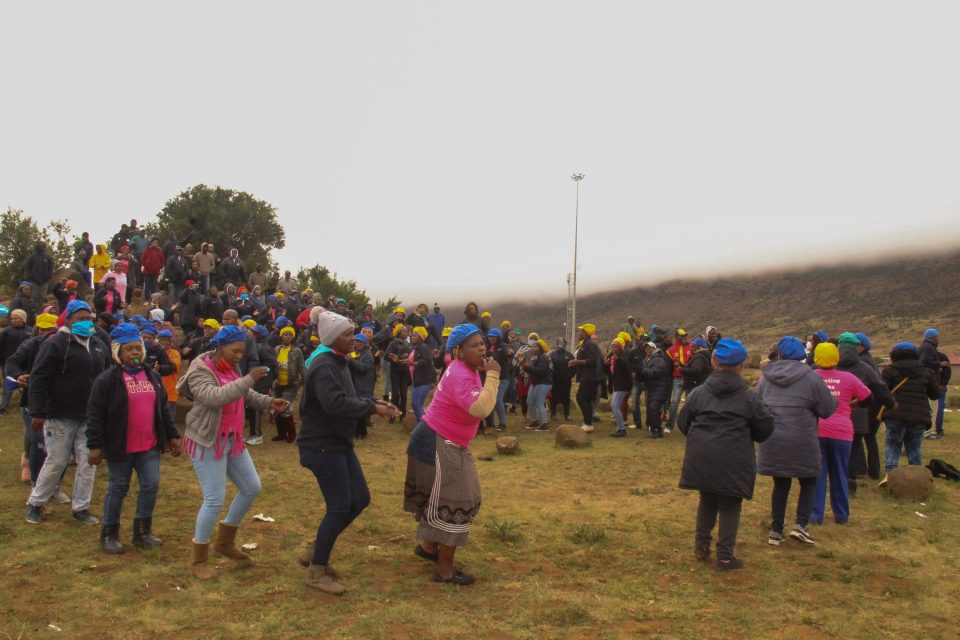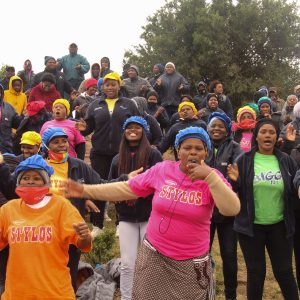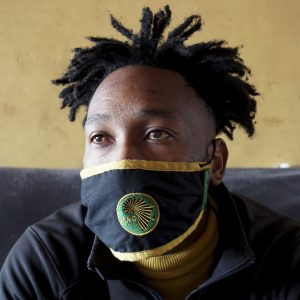Truda Foods staff expose bleak working conditions
In this second part of our story on a strike at the factory in the Eastern Cape, workers talk of inadequate toilet breaks, an allegedly unsafe environment and humiliating strip searches.
Author:
11 November 2020

Big factories that employ thousands of people in isolated rural areas should provide a lifeline to local communities. But attorney Stanley Malematja from the Right to Protest project at the University of the Witwatersrand’s Centre for Applied Legal Studies warns that these factories run the risk of becoming “corporate bullies” that see any collective action by employees as “an act of ‘biting the hand that feeds them’.”
In Komani in the Eastern Cape, workers at Truda Foods, which produces porridge, soya mince and maize snacks, have been locked in an ongoing labour dispute over working conditions.
Following a week-long strike at its Komani plant, the company, which also has factories in Pietermaritzburg and Cape Town, succeeded in interdicting the Komani Residents Association (Kora) and the South African Security and Allied Workers Union (Saswu) from disrupting operations.
The interim interdict also prohibits workers and Kora from posting “untrue and defamatory” statements about Truda Foods on social media. The labour court in Port Elizabeth will decide on a final order on 9 December 2020.
Part one:
“In situations where an employer and employee cannot agree on certain issues, the employee reserves the right to picket,” says Malematja. While it may seem reasonable for a company to ask the courts to prevent obstruction at the company’s gates, “one cannot help but ask the question as to where [workers] were supposed to picket?”
“The right to picket supports and advances a collective voice which cannot be easily overpowered,” Malematja adds. Truda Foods’ interdict “silence[s] those who have concerns against the employer. The reality is that the final interdict will form a barrier against the constitutional right to picket.”
Several workers who are currently suspended spoke out about working conditions at the factory.
Strip searched
Suspended employees Nosisa Godlo, Nozuko Maqholo and Maki Moni, women in their 40s, say they were subjected to a humiliating strip search after R900 went missing in 2018.
The women say they were instructed to remove their clothing and shake their naked breasts so the stolen money would “fall out”. The cash was later found elsewhere.
Maqholo, speaking on behalf of the other women, says: “We were instructed to go to the toilet to be searched with the aim to find this R900. They told us to strip off everything including our underwear. Then the supervisors, also Black women, searched six of us. They told us to take off our bras, and we had to shake our breasts.

“We reported the supervisors to the manager. We were then called to the office. We saw two men there. They put something on my finger, something like a computer … they asked me what happened. It may have been a lie detector test. I told them what happened. After that I went home.
“Then the supervisor apologised. But another manager told us that we signed a contract that gives the supervisor the right to search us. That was the end of it. They found the money, but not from any of us who were stripped naked. They found it from someone else from the clocking system. They never apologised to us after they found that money.”
Truda Foods chief executive Colin van Heerden says Godlo, Maqholo and Moni voluntarily agreed to shake their clothing after being accused of theft.
“At no stage was any clothing removed. Nevertheless the company considered the supervisor’s actions inappropriate and a disciplinary hearing was held which resulted in the supervisor being disciplined.”
Maimed and fired
Also in 2018, Sizo Martins, 26, lost a portion of his finger and received little compensation from the company.
The incident happened when a chip packet machine malfunctioned. When he turned it off, the machine “sucked [my] finger in”. “I first lost one phalange. Then I got sepsis. The second phalange had to be amputated. I told the managers the machine had malfunctioned, but they wrote that I was injured by a screw.
“I got very little compensation, and nobody could give me a straight answer. When it is cold, it really hurts and the doctor told me it will hurt for the rest of my life,” says Martins, holding up his stump.
Related article:
Another employee, Vuyiswa Gontsana, 39, began work at the company five years ago. While at work one day, she ran out of sanitary pads and asked a supervisor for one. She says she was then disciplined for waiting in the toilet for the pad for “too long”.
She was later fired for being sick. Kora secretary Thulani Bukani says Truda Foods wants workers to visit only doctors chosen by the company when they are sick. If employees visit their own doctors, the company allegedly summons them to disciplinary hearings. “This is terribly unfair because it is their own doctors who know the workers’ medical histories,” Bukani says.
“The management said my sick note is not right because it did not specify what illness I had,” Gontsana says. The CCMA ruled that “there was no justifiable reason” for the dismissal which was “substantively unfair”. They went further to say that Gontsana should be reinstated with a month’s backpay.

Gontsana also says workers must clock out before they go to the toilet. “They do not allow us to spend more than two minutes in the bathroom. After two minutes, the supervisor calls you back regardless of whether you are finished or not. We have big problems in this place.” This was confirmed by several other workers.
But Van Heerden said “there is no such thing as a two-minute toilet rule”. He said Truda Foods did not accept sick notes from two local doctors who, he said, “sell” medical certificates. Gontsana was fired for absenteeism and Truda Foods had already asked the CCMA to rescind the award made in Gontsana’s favour.
Truda Foods insists that employees provide a medical certificate even for one day off sick but the Basic Conditions of Employment Act says employees should produce medical certificates if they are off for “more than two consecutive days or on more than two occasions during an eight-week period” if they want paid sick leave.
Injured on duty
Ntombekhaya Swartland, 39, says she was injured in June this year on the night shift when she slipped at work while wearing flimsy canvas shoes. Truda Foods did not supply her with safety boots.
“My job is to put the flavouring on the chips. When I was going to do that, I slipped and hit my elbow. I was dragged by the machine and could not get up. My colleagues rushed to pull me, and the supervisor promised to phone for an ambulance. But first, my supervisor asked me to clock out and wait in the office. They never called the ambulance even though I was in so much pain. I sat in the office for a few hours until I was dropped at home at 5am. I paid for a private doctor. I was given one week off. My elbow was still very painful but the manager said my sick leave was used up. I had to come back to work with my arm in a sling,” she says.
Van Heerden says Swartland had only slipped and the injury to her arm was not serious.

He says packers such as Swartland are not given safety boots because the boots “are clunky and uncomfortable and primarily designed to protect against heavy objects falling on the shoe.
“Packers are not exposed to this risk. Floors can be slippery when water, maize or vegetable oil is spilled on the floor. Spilling any of the above is not part of the manufacturing process and can only occur due to employee negligence or disregard for manufacturing procedures.”
He says some workers wanted safety boots because “it’s more of a status thing. Higher-paid skilled employees are more likely to be wearing safety boots. While they cost twice as much as takkies, they do last longer. We will probably offer staff an option in future.”
Brakes fatality
Former Truda Foods worker Nelson Mpiti says in 2016 his colleague Thamsanqa Makhubalo died allegedly after the brakes failed on a Truda Foods truck he was driving. Mpiti says he was fired for complaining about the condition of the vehicles.
“That truck itself was not roadworthy. We used to be pushed by supervisors to drive. So unfortunately, Makhubalo was promised if he did not drive the truck, he would lose his job. So because of the condition of the truck, he lost his life. The road was winding downwards on a mountain, and the truck did not have brakes. One of his assistants was critically injured.”

Van Heerden says that although Makhubalo’s family alleged that faulty brakes on the Truda truck caused his death, “vehicle tracking showed that the driver was speeding down the hill. It’s very sad to lose a fellow worker. Drivers are allocated to a specific truck. No one knows that truck better than they do. Things can go wrong between service intervals. The only way we would know about this is if the driver told us. We have never and will never force a driver to drive a truck that he is not comfortable with.”
A document provided by Truda to Saswu shows that there have been 31 injuries on duty at the factory in 2020 alone. These injuries included metal and cement going into workers’ eyes, slips from wet floors, falling down stairs with no handrails, cuts from rough edges of machines, a worker who was injured when “cleaning the machine and a big screw fell on her foot” and two workers who were “badly hurt” after a “trailer in front of them hooked off and hit them from the front”.
Covid-19 relief payment confusion
Nomthandazo Nogoba, 63, worked at Truda Foods for 10 years packing leftover food to be sold to farmers as pig feed. Nogoba says she was one of a group of older women workers who were sent home temporarily at the beginning of lockdown to protect them from Covid-19.
“I was told I could be a victim because I am too old, and I must take leave for the period of Covid-19 and come back to work later. The manager gave me some papers and I went to the Department of Labour to get my Covid-19 [Unemployment Insurance Fund (UIF)] payment. When we got there, the department … said, ‘You guys have resigned according to the papers that were submitted by Truda.’ More surprising, Truda had never paid my UIF deductions over to the Department of Labour – for 10 years,” Nogoba says.
Several workers say that during the lockdown they went to the Department of Employment and Labour to get Covid-19 temporary employer and employee relief scheme (TERS) payments, but were told the company had never paid their UIF contributions.

When they complained to Truda Foods, they were then quickly registered, but their UIF contributions were only partially back paid. Others say they did not receive their UIF TERS payments and were told that Truda Foods was holding the money in a trust fund instead.
Van Heerden says this was untrue and probably “stems from the shambolic state of record keeping within the Department of Labour”.
“If your UIF record is not accurate, you don’t have the automatic right to accuse your employer of theft. It’s inconceivable that an employer that voluntarily pays millions of rands a month in employee life insurance, disability, funeral, provident fund and taxis to and from work, etc, would try and steal a few thousand rands for UIF.”
Related article:
He adds that the UIF TERS had “been nothing but a complete disaster” for Truda Foods after a few Truda employees were overpaid and the majority were not paid at all. According to Van Heerden, Truda then decided to pay all staff in full but was later told by the department that it should have returned the overpayment instead. Truda put the overpayment in a trust fund. “What this also means is that all the people who were not paid [by the department but paid by Truda Foods] …will have to pay Truda Foods back for the advances they received,” Van Heerden says.
Selby Mathabula, legal officer at the Casual Workers Advice Office, says the Basic Conditions of Employment Act prohibits unlawful deductions from workers’ wages. “If Truda Foods wants to deduct from the employees’ remuneration, they must do so in terms of a written agreement with the employees, an agreement which can never be concluded through coercion or duress,” Mathabula says.
‘Not a villain’
Van Heerden says he has created 5 000 jobs at the Truda Foods factories and should not be cast as a villain.
“It’s obvious that this country needs jobs. It’s also obvious that those in power don’t know how to create enough real jobs. And it’s obvious that those who know how to create employment are few and far between. I sit here writing this feeling like a fool [who] has to explain the obvious, an idiot trying to explain that when you drop a pencil it will fall to the ground, when all those around you say it will go upwards,” Van Heerden says.
Van Heerden says there are two Kora organisations and alleged that Bukani and the other two leaders were expelled from the “original and legitimate Kora”.
Bukani explains that Kora is a community-led movement and says a group of its members who wanted the organisation to align with the ANC broke away to form their own organisation. “We refused that. It has nothing to do with Truda Foods or any person who is outside. Truda Foods was previously donating food to us, so how would they have donated to a fake organisation?”



